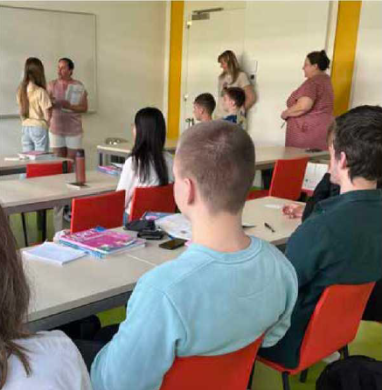Czech in 710 Hours
8. September 2023You may have noticed a modest and unassuming group of students gathering daily around 9 a.m. near classroom 217. These were international students learning Czech as a foreign language, preparing themselves to enrol in full-time degree programmes at Tomáš Baťa University (TBU).

The intensive preparatory Czech language courses for foreigners are part of a wider array of Czech language courses offered at TBU. The first intensive preparatory course was held at our university in 2006, and, with a few breaks, has been conducted annually ever since. From the 2022/2023 academic year, the Faculty of Humanities took over the organisation of this course. Participants come from a variety of countries, such as Vietnam, Colombia, Mexico, South Africa, or India, and even from Sweden, Moldova, and North Macedonia. This year’s course included several students from Ukraine, as well as participants from the Philippines and Mongolia.
The course is truly intensive, with daily lessons lasting 4–6 hours, taught this year by three lecturers: Dr. Milan Orálek, Dr. Zdeněk Šohajek, and Dr. Petra Bačuvčíková.
Afternoon activities were additionally organised by students from the Department of Modern Languages. The course starts from absolute basics: Hello! Nice to meet you! I don’t understand. Goodbye. The students not only adapt to a new language but, for many, also to a completely new life in an unfamiliar cultural environment. They tackle bureaucratic challenges, get acquainted with the university, meet other students, experience canteen food and life in the Czech Republic in general, adapt to dormitory living, and deal with the weather—imagine the uncertainty of deciding whether to attend class when it’s snowing! They miss the wind, good rice (and, of course, their family and friends).
What do they find most challenging about Czech? Most Czechs think it’s ř, but that’s not the case. The ř isn’t particularly hard or essential; sounds like h or ch often pose greater challenges in terms of pronunciation. However, the biggest hurdle isn’t pronunciation or grammar—it’s communicating with Czechs in Czech. Czech people often lack the patience to wait for a foreigner to “get the words out” in Czech and quickly switch to English.
Until roughly November, English is used as a lingua franca in the course, but the lecturers gradually phase it out. By the time we approach the A2 finish line at the end of January, we’re already speaking exclusively in Czech.
The next milestone is reaching a solid and confident B1 level, ideally B2. At this stage, some students inevitably drop out. It’s understandable; learning a language in just a few months is incredibly demanding—we all know this from personal experience. Hats off to anyone who manages it! By the end of May, most students pass their final exam at the B2 level, can comfortably navigate everyday situations, chat with Czech friends, write a motivational letter, watch a film, read a book, call Zlín their home, create a Twitter account in Czech, and tackle challenging university entrance exams, including the Czech language test at B2 level. They’re undeterred by Czech humour, the colourful slang of today’s youth, or even the “pea purée with sausage and bread” served in our canteen, which they grow to love.
Text: Petra Bačuvčíková